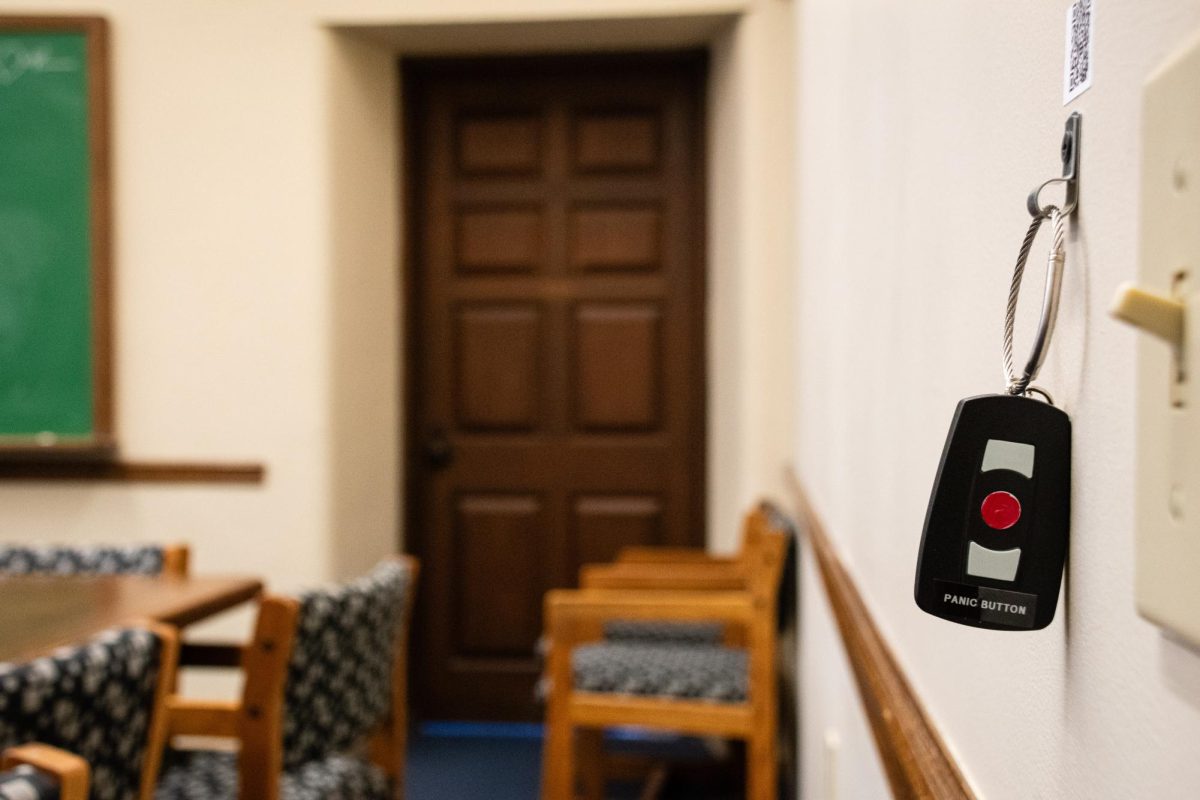The installation of panic buttons in some classrooms is a “step in the right direction” to improving safety measures on campus, according to Sydney Greenway.
“I just hope that that’s not the end of all safety measures going forward,” Greenway, a junior urban planning major, said. “That cannot be the last step that Pitt takes to protect its students from the very real gun violence epidemic that’s happening.”
Bradley Kiefer, a Pitt police lieutenant, said as of May 2023, “about 40” panic buttons had already been installed in academic classrooms. Over the summer, Pitt’s safety office worked to raise that number to approximately 400. Kiefer said that they’re “working to put them in as many classrooms as possible.”
According to Kiefer, once the panic button is pressed, the door will automatically lock. Kiefer said people inside the classroom can still exit, but they will not be able to re-enter. Pitt Police have the ability to lock down any classroom with the electronic lock feature. However, not all classrooms have electronic locks.
Kiefer said the classrooms that don’t have electronic locks had manual locks installed, so someone in the classroom has to lock the door themselves in the case of an emergency. All classrooms will eventually have an electronic lock, and “everyday there is more being installed.” He added that pressing the panic button will still notify the police.
“They’re not in every building at this point, but we’re working to put them in as many classrooms as possible,” Kiefer said. “Right now, the initial plan was to put them in the largest academic classrooms first.”
In March of 2023, a hoax call made to police claimed that there was an active shooter at Central Catholic High School in Oakland, causing Pitt’s campus to lock down. Then, in April, another hoax call was made to police claiming that an active shooter was in Hillman Library. According to the University Times, the process of installing panic buttons and electronic locks in classrooms was accelerated due to the hoax shooter calls that happened last semester.
Shannon Reed, a teaching associate professor in the English department, said the panic buttons “have the potential” to make her feel safer.
“I appreciate that the panic buttons are a step towards greater campus security and that in some situations may save many lives. As a faculty member, I received an email about the panic buttons from the Registrar’s Office,” Reed said. “It provided two websites for further information on how they work, why they were installed, etc. I went to both and learned more there.”
Reed said she wants to see what happens when the buttons are “deployed.” She is hearing impaired and said she wonders if she’ll be able to hear instructions or the police outside her classroom door.
“Right now, I worry more about someone hitting it by mistake or as a prank, and causing chaos,” Reed said. “And I also worry that if we were to have an active shooter incident, people in rooms with panic buttons might be more likely to shelter in place instead of run, which is often the safest option.”
Reed said she questions if the technology of the buttons will work as smoothly as intended in the event of an emergency.
“It seems that technology like this or protocols like this are often put into place without any testing or practice, and then, when they’re needed, don’t work as was hoped,” Reed said. “So I’m a little skeptical of how helpful they can be without training faculty on how to use them and what happens after you hit the button.”
Pitt faculty members received an email about the panic buttons over the summer, according to Reed, but students did not. Patrick Bull, a sophomore math major, said he does not know much about the panic buttons, but he added that he’s seen them around campus.
“I guess the only bad thing that could happen is if someone accidentally hit it,” said Bull. “Overall, I think the benefits outweigh the bad parts though.”
Coco Reed, a sophomore public health major, feels better knowing that with the panic buttons if there is a threat outside the classroom, there is a smaller chance of the threat affecting those inside classrooms.
“I believe students at Pitt take security very seriously and I would be shocked and upset if someone set one off as a joke,” Reed said. “I trust that Pitt would check them often enough to ensure that they are in working condition.”
While Greenway is “pro the installation” of panic buttons, she said she hopes there will be more safety measures to follow.
“I think this is a fantastic first step, but I think there’s always more that can be done,” Greenway said. “There should always be more research and more policy to protect students.”


